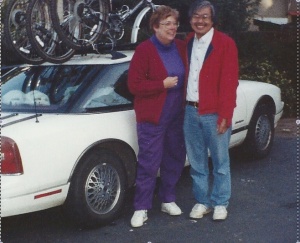Things have been chaotic for me–for us, really, though Lowell may have a different take on it–for a couple of weeks now. I could say this has been going on for over a year, since July 1, 2013, the hot, sweaty day I found Lowell asleep on our deck wearing black fleece, burning up with fever, and rushed him to the hospital. He went from urgent care to emergency, and into a hospital room where, his horrible infection undiagnosed, he nearly died.
From there we went to a major cancer center, where specialized oncologists knew what was making him so deathly ill: an infection in his chest cavity called empyema. After a week in the hospital there, and much draining of chest fluids from the infection, he wore an antibiotic pump from early September 2013 into January 2014. The pump was stunningly heavy and this uncomplaining man never said a word about wearing it day and night all those months. Every day, it seems, I learn more about how remarkable he is.
Now I am living in his hospital room while he is receiving chemotherapy for acute leukemia and is being prepared for a stem cell transplant. Today is Day 5 of his preparation, which I believe goes on for 30 days and is intended to put his acute leukemia into remission. All of this is part of the chaos of my feelings; I never had the illusion I could control much, but now certain challenges in my life seem to have taken on a life of their own.
I’m digging into myself, looking for spiritual reserves that contain the kinds of disciplines that can carry me though these times. Prayer is basic, and I am finding a new definition of “fervent” in myself. I always had trouble praying for myself, though not in praying for others. But now I know, even though I phrase the prayers as for Lowell, they are all in a very deep sense for me too. “Thy will be done”–is this a joke? MY will be done, I think, and my will is that all his treatments are successful and he is cured of this dreadful disease. MY will.
Yet where does that leave me knowing that not one bit of it is under my control? The thing I learned from Buddhism is that much emotional suffering comes from me wanting to control outcomes, when rationally I know that I have very little or no say about most such things. I control whether I do my best in life, and, practically speaking, nothing else.
As someone once said, I can’t control what happens, only how I respond to it. In a matter so dear to my heart as Lowell’s health, I’m obliged to let go and maintain hope while maintaining calm caring–and while not demanding that things come out the way I want them.
I keep telling myself this. Is it helping? Maybe. Time will tell. Since life feels so chaotic, I have to work with the chaos in myself to see the emerging new order. Whatever happens, we will not be the same. I liked us as we were. That is already gone. We continue to be more of whomever we’re becoming.
All of which says exactly nothing but I feel better for having written it here.





